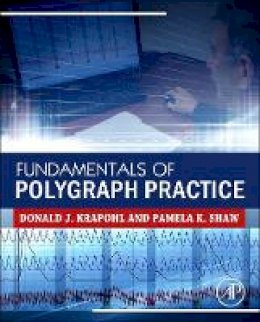
Stock image for illustration purposes only - book cover, edition or condition may vary.
Fundamentals of Polygraph Practice
Donald Krapohl
FREE Delivery in Ireland
Description for Fundamentals of Polygraph Practice
Hardback. .
Though polygraph has been the mainstay for government and police departments since World War II, it has undergone substantial transformation in recent years. Fundamentals of Polygraph Practice bridges the gap between the outmoded practices and today's validated testing and analysis protocols. The goal of this reference is to thoroughly and concisely describe the evidence-based practices of polygraphy. Coverage will include: psychophysiology, testing techniques, data collection, data analysis, ethics, polygraph law, alternate technologies and much more. This text addresses the foundational needs of polygraph students, and is written to be useful and accessible to attorneys, forensic scientists, consumers of polygraph services, ... Read moreand the general public. Show Less
Product Details
Publisher
Elsevier Science Publishing Co Inc
Place of Publication
San Diego, United States
Shipping Time
Usually ships in 4 to 8 working days
About Donald Krapohl
Mr. Krapohl polygraph career started in the private sector in 1979, conducting testing for attorneys, police departments and commercial firms in St. Louis, Missouri. In 1985 he was recruited by the US government to perform polygraph testing for intelligence and security purposes, and Mr. Krapohl conducted many significant and highly sensitive cases during that time. Ultimately he became ... Read moreinvolved in government research on the polygraph, which led to his assignment in 1997 to the US government's polygraph education and research organization at Ft. Jackson, SC. Working among leading scientists in this area afforded Mr. Krapohl new opportunities to investigate the potential, and potential limits, of the polygraph and to explore other technologies that might augment or replace it. His primary focus as a researcher was the development of best practices, and the use of empirically based methodologies. His work led to, among other advances, a polygraph algorithm now used on most computer polygraphs. His expansive terminology reference for polygraphy is the standard in the field. He was a member of the team that validated the Preliminary Credibility Assessment Screening System, a technology now a major component of force protection for the US military. Mr. Krapohl helped craft the charge given the National Research Council during its survey of the literature on the validity of polygraph screening in 2003. Mr. Krapohl made technical presentations on the government's use of credibility assessment technologies to workshops hosted by the National Academy of Sciences and the National Science Foundation. Following six very productive years in the Research Branch Mr. Krapohl was designated the facility's Deputy Director. He retired from government service in 2015. In his career he has authored more than 100 published research papers, general interest pieces, technical articles and book chapters on credibility assessment and related areas. Outside of his government service, Mr. Krapohl was the Editor-in-Chief for the publications of the American Polygraph Association (APA), 1997-2003 and 2007-2014. He served as APA President in 2006. He has been the recipient of numerous awards for his research and presentations. Ms. Shaw began her career in polygraph in 2000 while employed with the Kentucky Law Enforcement Council, a state government agency established to oversee certified police officers and provide pre-employment testing services for over 400 law enforcement entities. During her 14 years with the Council she served as an examiner, supervisor and polygraph school director for the state. She additionally established her own polygraph company, Shaw Polygraph Services, Inc., in 2006 where she administered specific issue and post-conviction sex offender tests and engaged in various educational and consulting endeavors to include quality control services and curriculum development. Ms. Shaw has provided numerous lectures to a variety of state, national and international polygraph associations, as well as American Polygraph Association (APA) accredited schools. She has also served as a consultant to diverse local and government agencies in the U.S., South America and Asia-Pacific regions. In addition to managing her private polygraph company she is also currently the owner and co-director of the National Polygraph Academy based out of Lexington, KY. The school is accredited by the APA and recognized by the American Association of Police Polygraphists. The school provides professional training to law enforcement, government and private sector students in various locations in the U.S. and abroad. From early on in her career, Ms. Shaw has been a strong advocate of education and professional practices in the field of polygraphy. She is the recipient of awards for her presentations and participation in committees responsible for publishing model policies for post-conviction sex offender testing, law enforcement/public service screening as well as the APA's 2011 Meta-Analytic Survey of Criterion Accuracy of Polygraph Techniques. Ms. Shaw served as President of the American Polygraph Association in 2012 and held other board positions for 6 years. She has also served as president and vice-president of the Kentucky Polygraph Association and is a member of additional professional polygraph associations including the American Association for Police Polygraphists and the American Society for Testing and Materials International. Show Less
Reviews for Fundamentals of Polygraph Practice

